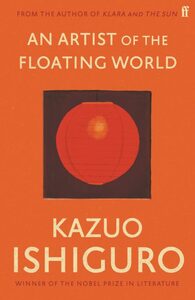Take a photo of a barcode or cover
reflective
slow-paced
I was really surprised by the deftness with which Ishiguro crafted this character, a narrative so different from his other, more famous novels. This perspective of patriotism in post war Japan from a retired artist is really interesting and the use of unreliable narration crafting a conflicted mindset — our narrator feels both guilty and proud of his past, asking how he must adjust the way he addresses his career in the wake of modern Japan’s attitude toward him, how this might have tangible effects for him family, too. Through lovely, meditative prose, Ishiguro poses these questions about patriotism, about choices one has made, about guilt and where it must be placed and where it manifests itself in the consciousness.
'Army officers, politicians, businessmen, Matsuda said. ‘They've all been blamed for what happened to this country. But as for the likes of us, Ono, our contribution was always marginal. No one cares now what the likes of you and me once did. They look at us and see only two old men with their sticks.' He smiled at me, then went on feeding the fish. 'We're the only ones who care now. The likes of you and me, Ono, when we look back over our lives and see they were flawed, we're the only ones who care now!’
'Army officers, politicians, businessmen, Matsuda said. ‘They've all been blamed for what happened to this country. But as for the likes of us, Ono, our contribution was always marginal. No one cares now what the likes of you and me once did. They look at us and see only two old men with their sticks.' He smiled at me, then went on feeding the fish. 'We're the only ones who care now. The likes of you and me, Ono, when we look back over our lives and see they were flawed, we're the only ones who care now!’
emotional
inspiring
sad
slow-paced
Plot or Character Driven:
A mix
Strong character development:
Yes
Loveable characters:
Yes
Diverse cast of characters:
No
Flaws of characters a main focus:
Complicated
reflective
medium-paced
emotional
reflective
medium-paced
Plot or Character Driven:
Character
Strong character development:
Complicated
Loveable characters:
Complicated
Diverse cast of characters:
No
Flaws of characters a main focus:
Yes
I didn't enjoy this one. While there were parts that were interesting, the majority of the book was very vague and came across like the ramblings of an old man. The narrator was very unreliable and sexist and condescending. The jumps from year to year were super confusing as it would transition between sentences (despite the sections of the books being particular points in the narrator's life). It was also super confusing. I don't understand what happened at many points nor to certain characters. The narrator spent the whole book talking about how important he was to Japan's history and his recollections reflect this narrative, yet every other character tells him he's irrelevant so I have no clue what the truth of the matter is. Also, everyone was super passive aggressive. Definitely not what I was expecting and all around disappointing. 2 Stars
informative
mysterious
reflective
slow-paced
Plot or Character Driven:
Character
Strong character development:
Complicated
Loveable characters:
Complicated
Diverse cast of characters:
No
Flaws of characters a main focus:
Yes
reflective
sad
slow-paced
After reading Never Let Me Go, I swore that I would read more of Ishiguro's work. It was fate that I ran across An Artist of the Floating World at my Library. The novel isn't a particularly long one - coming in at a mere 206 pages. It was a breeze to get through.
I'm noticing that with Ishiguro's narrators so far, the tone is very conversational. Throughout this book, the protagonist Masuji Ono, a retired artist, speaks intimately to the reader
Throughout the book, Masuji Ono, the protagonist, speaks to the reader directly. Much like in real conversations, there are tangents and complete changes of topic.Masuji, a retired artist, often finds himself wanting to describe what happened with one of his daughters , but somehow takes us back to his days of art apprenticeship and the trials Japan faced during WWII. The conversational tone added to how quickly the book passed, for me,because the stories were very interesting and it felt odd to have to put the book down during his conversational recollection.
I don't really know how to tell you what the book is about. Masuju is trying to make sure his second daughter is able to marry. In Japan, there is a process prior to the marriage where both families investigate one another to make sure that they are pleased with the history of the family. They go as far as to hire investigators for this process.Masuji is particularly worried for his daughter because the year before, the suitor's family backed out of the marriage without any good reason. His daughters hint that this may be because ofMasuji's past.
The book is very slow to reveal what it is that could potentially be spoiling his daughter's chances at marriage - but the journey that leads you there is an altogether interesting one.Masuji's opinions, which he heavily showcased in his paintings during WWII, are no longer held by society. They are in fact looked down upon by society. In Japan, people fault you for your past.
I enjoyed the parts of the book that directly related to his art. The stories of his daughters were secondary. As a young child, he enjoyed painting and knew he would not take on the family business like his father wanted. I felt sympathetic to Masuji's character. I'm very familiar with what it is like to have your career belittled by others. The form of training that was offered in Japan for aspiring artists at that time is so interesting to me. When I was younger, I attended an art school over the summer where we were encouraged to create our unique style. In Japan, you gained respect by mimicking the style of an already famous artist.
This novel has a very under-stated message. It speaks of misunderstandings and the changing views of a society. Masuji Ono, represents the "older" generation of Japan, the old views of how things are. His daughter's husbands represent the new generation, the generation of "change" which misunderstands the past. This short novel is able to give you a snapshot of post-war Japan in all its melancholy state through the eyes of a jaded retired artist.
I'm noticing that with Ishiguro's narrators so far, the tone is very conversational. Throughout this book, the protagonist Masuji Ono, a retired artist, speaks intimately to the reader
Throughout the book, Masuji Ono, the protagonist, speaks to the reader directly. Much like in real conversations, there are tangents and complete changes of topic.Masuji, a retired artist, often finds himself wanting to describe what happened with one of his daughters , but somehow takes us back to his days of art apprenticeship and the trials Japan faced during WWII. The conversational tone added to how quickly the book passed, for me,because the stories were very interesting and it felt odd to have to put the book down during his conversational recollection.
I don't really know how to tell you what the book is about. Masuju is trying to make sure his second daughter is able to marry. In Japan, there is a process prior to the marriage where both families investigate one another to make sure that they are pleased with the history of the family. They go as far as to hire investigators for this process.Masuji is particularly worried for his daughter because the year before, the suitor's family backed out of the marriage without any good reason. His daughters hint that this may be because ofMasuji's past.
The book is very slow to reveal what it is that could potentially be spoiling his daughter's chances at marriage - but the journey that leads you there is an altogether interesting one.Masuji's opinions, which he heavily showcased in his paintings during WWII, are no longer held by society. They are in fact looked down upon by society. In Japan, people fault you for your past.
I enjoyed the parts of the book that directly related to his art. The stories of his daughters were secondary. As a young child, he enjoyed painting and knew he would not take on the family business like his father wanted. I felt sympathetic to Masuji's character. I'm very familiar with what it is like to have your career belittled by others. The form of training that was offered in Japan for aspiring artists at that time is so interesting to me. When I was younger, I attended an art school over the summer where we were encouraged to create our unique style. In Japan, you gained respect by mimicking the style of an already famous artist.
This novel has a very under-stated message. It speaks of misunderstandings and the changing views of a society. Masuji Ono, represents the "older" generation of Japan, the old views of how things are. His daughter's husbands represent the new generation, the generation of "change" which misunderstands the past. This short novel is able to give you a snapshot of post-war Japan in all its melancholy state through the eyes of a jaded retired artist.
slow-paced
Plot or Character Driven:
Character
Loveable characters:
No
emotional
mysterious
reflective
sad
slow-paced
Plot or Character Driven:
Character
Strong character development:
Yes
Loveable characters:
Complicated
Diverse cast of characters:
No
Flaws of characters a main focus:
Yes






